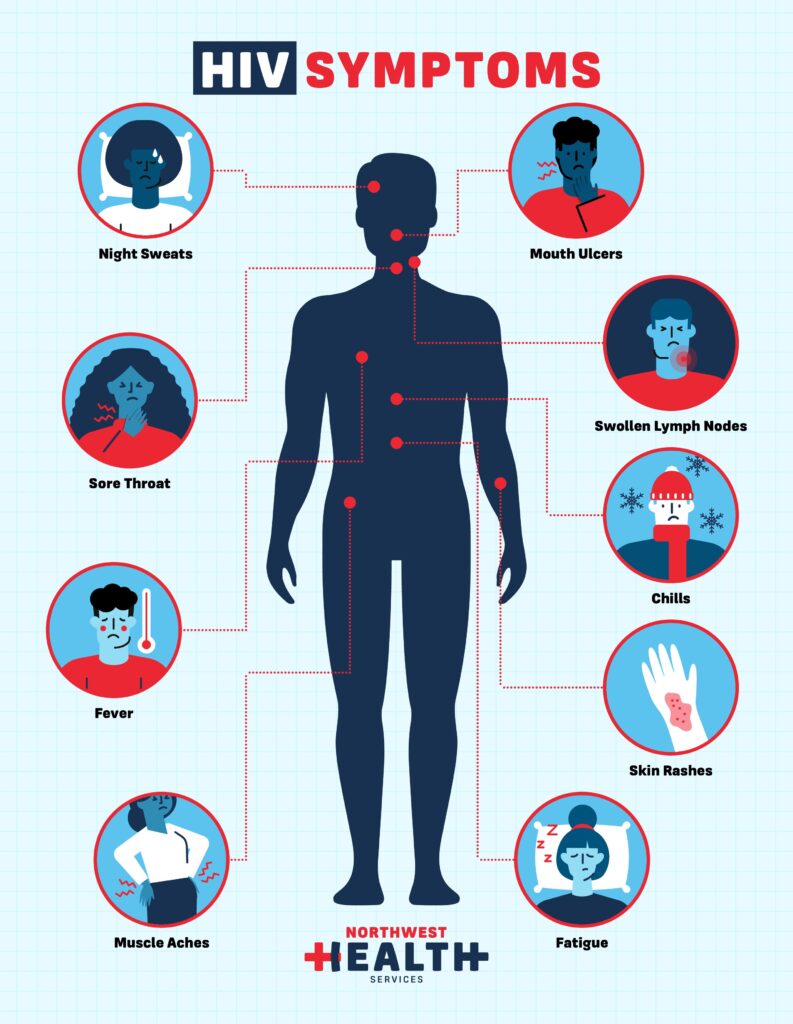HIV is an epidemic affecting over 38 million people worldwide, and 1.2 million people in the United States.
Human Immunodeficiency Virus (HIV) is a virus that damages or weakens the immune system which protects the body from harmful foreign bodies. A healthy immune system is able to attack and clear out infections; however, untreated HIV prevents the immune system from fighting off infections and diseases.

HIV Testing Services: What to Expect
Northwest Health Services provides FREE HIV testing. This HIV antibody and antigen test requires a finger stick—just 1 drop of blood. Results are available in approximately 20 minutes.
Northwest Health Services uses the Abbott Determine HIV ½ Ag/Ab COMBO. This screening method is 98% to 99% accurate.
A Non-Reactive testing result means there were no HIV antibodies or antigens detected in the blood at the time of the screening.
*It is important to keep in mind the “Window Period.” This is the period of time following an HIV exposure in which the body has not developed enough antibodies to be detected, therefore, the HIV virus could be present, just not detected. For anyone who may have had a possible HIV exposure—a repeat screening is recommended in 3 to 6 months.
If the rapid test is reactive, it is necessary to draw a larger blood sample for comprehensive, confirmatory testing. The results from such testing will be available in approximately 3-5 days.
Regardless of the screening result—Our staff at Northwest Health Services is here to provide guidance and support:
- For individuals with non-reactive result, it is important to have a conversation with our HIV Prevention Specialist regarding PrEP. Pre-Exposure Prophylaxis (PrEP for short) is medication taken to prevent the transmission of the HIV virus. Although PrEP has been available since 2012, many people still are not familiar with PrEP or its benefits. When taken as prescribed, PrEP is about 99% effective in preventing the HIV Virus from establishing in the PrEP consumer’s body. PrEP is a remarkable advancement in the prevention of HIV and a huge step toward Ending the HIV Epidemic!
- For individuals with a confirmatory HIV diagnosis, even more support is available. Our staff will assure the person is linked to HIV care quickly, possibly within 24 hours after the diagnoses is confirmed! The medical provider will discuss overall health and prescribe the best HIV medication for the individual. Today’s HIV medications (called Antiretrovirals) are highly effective in suppressing the HIV Virus. This is important as the goal of HIV management is to suppress the HIV virus to a level so low, it can no longer be detected. When this suppression is achieved—that person cannot transmit the HIV virus to anyone else—even through sexual contact. This is referred to as U=U or Undetectable means Untransmittable. An individual living with HIV these days can live a long, healthy life as long as he/she complies with the medical provider’s recommendations and takes medication as prescribed.
If a suspected exposure to HIV occurred within the last 72 hours—Go to the nearest Emergency Room for immediate care! Post Exposure Prophylaxis (PEP) is medication taken to prevent the HIV Virus from establishing in the person’s body after possible exposure. To be effective, this PEP medication MUST begin within 72 hours of the exposure. The person will then be linked to a non-emergency health care provider for the full regimen (28 days) of PEP medication. Northwest Health Services has providers on staff for such non-emergency follow-up care.




PrEP Can Help Keep You Free From HIV
PrEP, or Pre-Exposure Prophylaxis, is a medication to reduce the risk of acquiring HIV. PrEP medication, when taken as prescribed, is 99% effective in stopping the HIV Virus from establishing and reproducing inside the body.
Janet Miller is our HIV Prevention Specialist, she can be reached at 816-901-1034.
Learn More About HIV
HIV can be transmitted through blood, semen (cum), pre-seminal fluid (pre-cum), rectal fluids, vaginal fluids, and breast milk of an HIV positive person. These fluids must come in contact with a mucous membrane or damaged tissue or be directly injected into the bloodstream (from a needle or syringe) for transmission to occur. Mucous membranes are found inside the rectum, vagina, penis, and mouth.
HIV is NOT spread through casual contact like shaking hands, hugging, OR sharing public facilities like water fountains or restrooms. HIV is NOT spread by saliva, tears, urine or sweat, nor is it spread by air, water, or insects.
Some people experience flu-like symptoms that include fever, chills, rash, muscle aches, fatigue, and mouth ulcers around the time they are infected by HIV. It is important to know, that not everyone experiences symptoms and that getting tested is the ONLY way to know if you are infected with HIV.
HIV (human immunodeficiency virus) is a virus that attacks the body’s immune system. If left untreated, AIDS (Acquired Immunodeficiency Syndrome) is the final stage of HIV infection and occurs when the HIV virus has severely damaged the body’s immune system. When this happens, certain infections are able to enter the body without resistance. Without treatment, AIDS can be fatal; with treatment, HIV may never advance to its final stage in becoming AIDS.
If you answer yes to any of the following questions, then you may be at risk for acquiring HIV and should get tested as soon as possible:
- Are you a man who has had sex with another man?
- Are you sexually active with a partner who is living with HIV?
- Have you had multiple sex partners since your last HIV test?
- Are you sexually active with partner(s) and been unaware of their HIV status?
- Have you recently tested positive (+) for a sexually transmitted infection (STI)?
- Do you infrequently use condoms?
- Have you injected drugs and shared needles, syringes, or other drug injection equipment with others?
- Do you engage in sex that involves exchange of commodities (housing, drugs, money, etc.)?
